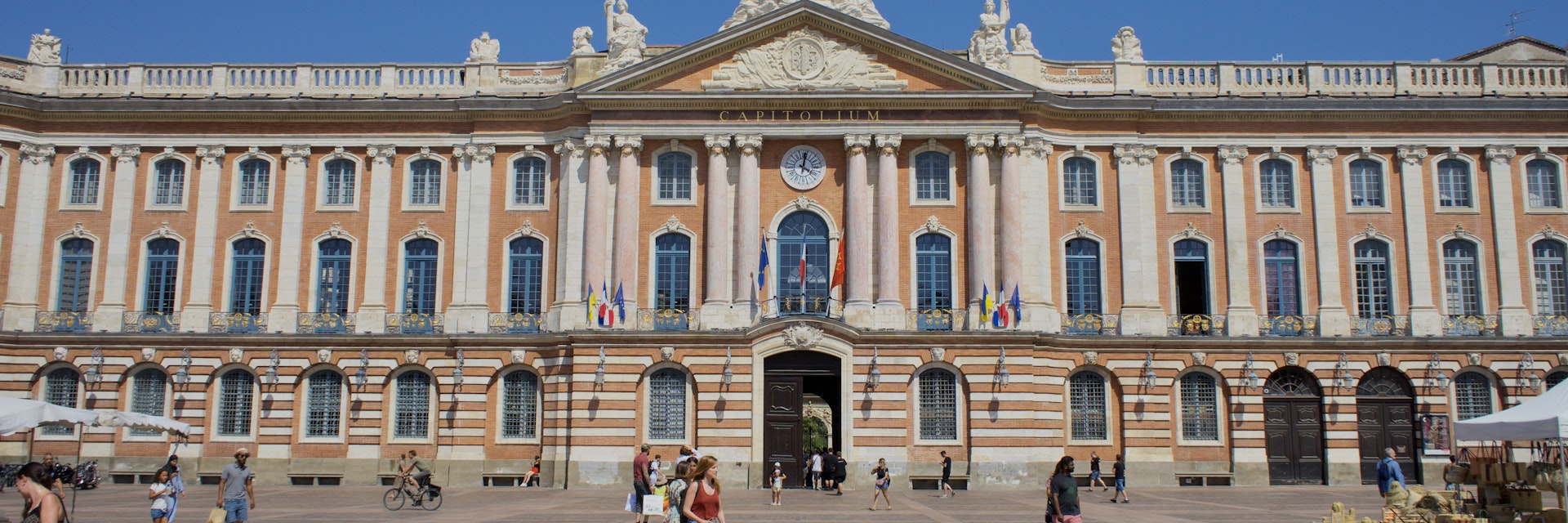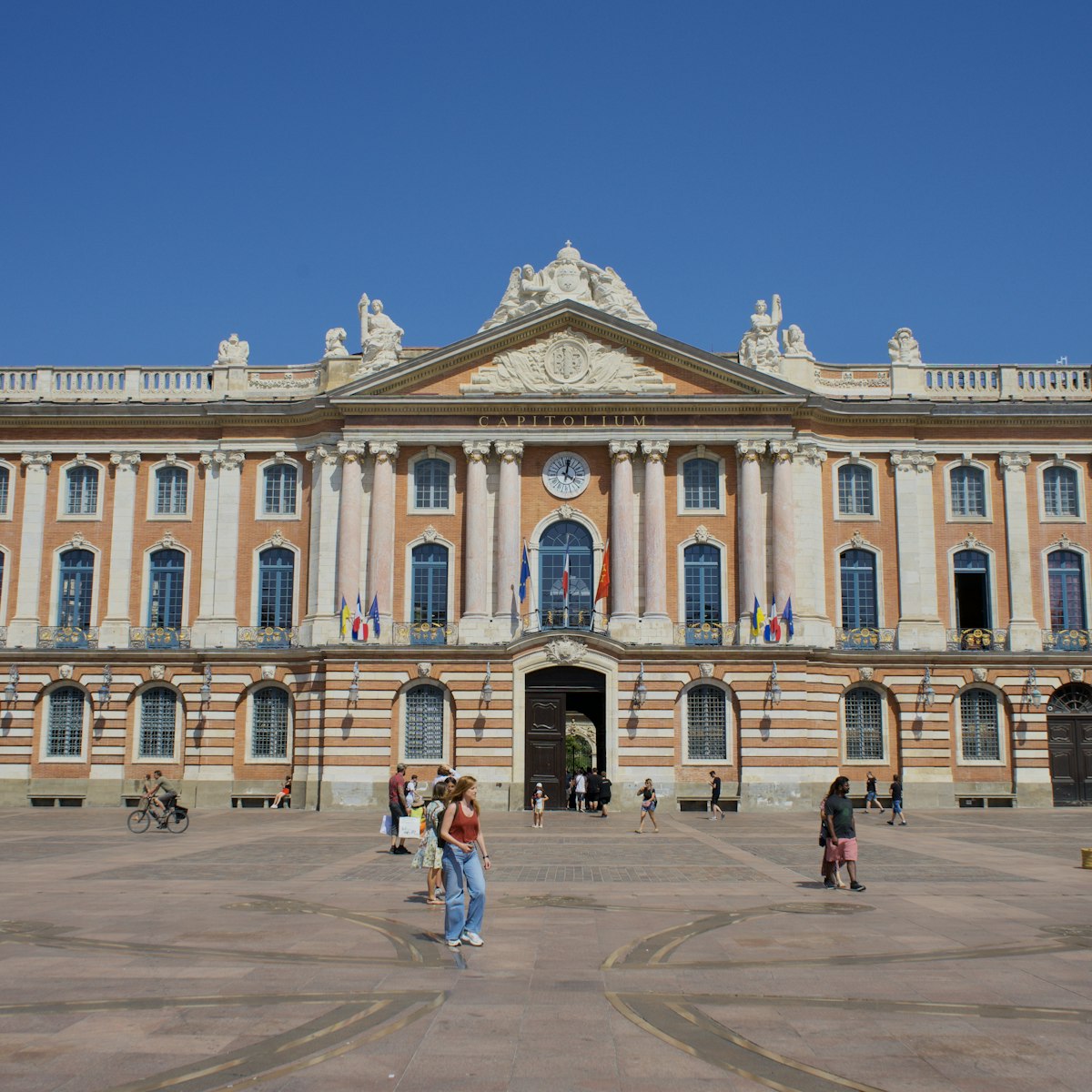Toulouse’s grandiose main square is the focal point in the heart of France’s "Pink City." A meeting point, a trailhead, a beguiling market and a convivial spot for afternoon aperitifs, the Place du Capitole is the place to start (and perhaps end) for any newcomer to Toulouse.
While the square has sat here for around 800 years, from 1750 it’s been dominated by the elegant 128m-long (420ft) facade of the Capitole (city hall), and the building is still the main backdrop for joyous selfies, jaunty TikTok dances and serious camera compositions.
The neoclassical masterpiece isn’t the only reason to spend time in Place du Capitole, though. The western side of the square is flanked by canopied terraces beneath Byzantine arches that hint at St Mark’s Square in Venice, while the medieval rue du Taur to the north is a riot of South American bistros, quirky stores and even hosts an open-air cinema. It eventually leads to the distinct Octagonal bell tower of the Basilica of Saint-Sernin, another of Toulouse’s finest sights.
Insider tip
If you’re here on a particularly sweltering summer’s day (and it can get very hot in Toulouse in July), then look out for the brasseries with parasols shooting cooling water mist down from above. They can make a sizzling afternoon of watching the world go by far more comfortable (there are also several ice cream stores lining the arcades behind).
How much time you need to visit Place du Capitole
If you have 30 minutes
Head into the Capitole itself and directly to the Salle des Illustres, where some of Toulouse’s finest paintings line ornate 19th-century rooms. Before entering, there’s a wonderfully photogenic grand staircase to climb, and the hallway’s opulent chandelier and patterned mosaic floor only add to the sense of occasion.
With no expense spared, the chambers on the second floor are finely decorated by majestic paintings, marble busts, swirls of gold, beautiful ceiling frescos and elaborate columns. The Salle Henri-Martin is particularly evocative, with its large impressionist paintings of local scenes in 19th-century Toulouse, brought to life by Martin’s ethereal use of light as the seasons change.
However, the Salle des Illustres is the centerpiece of the Capitole, and the 60m-long (197ft) room is where official receptions are often held. At the end of the 19th century, 20 artists were asked to produce works to celebrate "glorious episodes in Toulouse culture," and these paintings now line the walls.
If you have 1.5 hours
The daily market that pops up in front of the Capitole doesn’t have an official name, but its goods range from the useful to the eclectic. Flowing summer dresses neighbor up against '70s vinyl records, while you’ll also find straw hats and sunglasses that are handy against the rays of Toulouse’s summer sun.
Look down on the forecourt facing the Capitole entrance, and you’ll see a large golden engraving of an Occitan cross, with twelve star signs on each point. It’s the work of painter and sculptor Raymond Moretti. In 1997, he also painted the ceilings of the square’s western arcades with 29 frescos illustrating the history of Toulouse across two millennia.
Behind the place is the pleasant green Square Charles de Gaulle, dominated by the imposing Donjon du Capitole. Currently, it provides a spectacular home for the Toulouse tourist office, though the building dates back to 1525 when it held the gunpowder and the archives that guaranteed municipal freedoms. Architect Viollet-le-Duc’s 19th-century makeover added snarling gargoyles, a smart tiled roof and a Flemish-style belltower.
If you have half a day
Some of the bistros on the square, like Brasserie Les Illustres, offer breakfast from 8am, so you could start your day with a fine view of the Capitole before exploring its sublime halls.
Several historic streets spider off from Place du Capitole, though the most interesting is the Medieval rue du Taur to the north. Taking its name from the 14th-century Notre-Dame du Taur church, the start of the street is a fine photography opportunity as it twists by the steep buildings towards the pointed-hat bell tower of the Basilica of Saint-Sernin.
Pick up fiery empanadas from El Almacen or sit down for fresh Hawaiian poké bowls at La Cabane à Poké before exploring Saint-Sernin itself. If you’re nearby in the evening, then there’s often live music on at La Cave Poésie, while between July and August there are open-air French/Anglo movies shown at Cinémathèque de Toulouse.
History of Place du Capitole
Allegedly located on the spot where St Saturninus was martyred in 257CE, the Capitole is built where the bishop was said to have been tied to the legs of a bull, which was then driven down the steps of the town's capitol and caused his head to be cracked open. It’s a rather gruesome tale to be associated with such a magnificent building, though the current Capitole wasn’t constructed until the 18th century.
In Roman times, city life was organized around the nearby square of Carmes and its ancient forum, but centuries later in 1190, the Capitouls (governing magistrates) of Toulouse embarked on the construction of the original Capitole to provide a seat for the government of a province growing in wealth and influence.
Architect and painter Guillaume Cammas gave the Capitole facade its Neoclassical style with the famous pink bricks between 1750 and 1760, and it’s been listed as a historical monument since 1840. The 1990s saw full pedestrianization of the square, and it’s been Toulouse’s tourist focal point ever since.
Tickets and other practicalities
The Capitole building’s Salle des Illustres is free to enter (subject to a security scan) and open from Monday to Friday between 9am and 7pm, while usually closed on Saturdays. On Sundays and public holidays, the hours change to 10am to 6pm.
As it’s an official building, always check ahead for any ceremonies before planning a visit. Earlier in the week is usually less busy inside.
Tours of Toulouse on the Petit Train road train are good for families, and the two routes last 40 minutes each. They leave on the north side of the square every 30 minutes and cost €8 for adults and €4 for children aged between 3 and 11 years.











